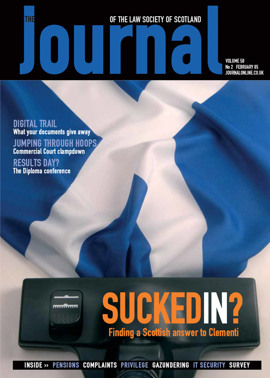Defining the guideline
The Professional Practice Committee approved the new guidelines (published last month) in the light of media interest and difficulties being experienced by the profession with the existing guidelines.
In particular with regard to the gazundering guideline it was the Committee’s view that purchasers who put in unrealistically high offers with a view to eliminating the competition and then seek to take advantage of their status as preferred bidders to renegotiate the price down should be required to instruct a new solicitor. Hiding behind a survey condition to achieve that was felt to be inappropriate.
While the Committee understand the concerns that solicitors may have about the new guidelines, it should be remembered that if a solicitor offers a price for a property on behalf of a client the seller is entitled to assume that the purchaser has come to a conclusion about what that property is worth to him or her personally unless there is a clear indication to the contrary in the offer. The Committee take the view that it is reasonable to allow the price to be renegotiated where the survey discloses some significant problem making the assumptions which the purchaser made in coming to his conclusion about price incorrect. Clearly, however, if the property is generally in good order and is not suffering from some significant defect that would materially affect the basis upon which the purchaser arrived at his original offer bid, it amounts to gazundering should they wish to renegotiate the price merely on the basis of the valuation.
In the Committee’s view the seller is entitled to know if valuation is critical to the offer, and if that is the case it should be stated. For example a clause might state that the offer is not only subject to survey but also to the valuation in that survey being sufficient to support the loan required by the purchaser. Clearly, this puts the seller on notice as to the real terms of the suspensive condition and they can factor that into their decision as to whether or not to accept the offer.
Where an offer discloses in terms that it is subject to valuation specifically then it will not fall foul of the gazundering guidelines.
On a separate but related issue, there does seem to be some misunderstanding regarding the sellers’ rights in the matter. Clearly, the gazundering guidelines are not intended to prevent a seller from approaching the prospective purchaser, who has withdrawn due to a poor survey or indeed a poor valuation, asking if he would be prepared to consider offering a lower price. This would not be gazundering provided that the approach comes from the seller.
With regard to disclosure of the actual terms of the survey report there is no change to the current position. If the survey does disclose for example extensive dry rot, the purchaser seeking to rely on that to renegotiate the price should satisfy the selling agent, first that the problem is real, and secondly that it does not relate merely to valuation.
In the event of a complaint of a failure to comply with the guidelines arising, the report that a purchaser is seeking to rely upon in renegotiating is likely to be considered by the CRO.
In summary, purchasers who offer subject to survey should be advised to consider the amount of their offer carefully. If they intend to reserve the right to renegotiate should the valuation be disappointing, they should expressly state that in their offer to leave the selling agent in no doubt what the true suspensive condition is. Sellers are entitled, in the event of the purchaser deciding not to proceed because of a disappointing survey, to offer to renegotiate and this will not fall foul of the guidelines. Solicitors should note that it is both in the purchasers’ and sellers’ interests that the time limits for “subject to survey” clauses, however they are framed, should be short and should be adhered to, to remove that obstacle at the earliest opportunity. Consideration should also be given to the existing guideline regarding delay in conclusion of missives.
The Department has also had enquiries from members wondering if a closing date can be brought forward in the event of an early pre-emptive offer being received. Provided all parties who have noted an interest are given reasonable notice of the new closing date, the Professional Practice Committee have no difficulty with this approach and it would not breach the guideline.
I trust that this clarifies the position on behalf of the Professional Practice Committee.
James Ness, Deputy Director (Professional Practice Department)
In this issue
- Sell or transfer? (1)
- Promoting competition or competitiveness?
- Promoting competitiveness or competition?
- Not the final word
- Challenge of the FSA
- The pull of the south
- A world of change
- Finding the path
- An elusive model?
- Bank on it
- Trouble at t'mill
- Hidden evidence
- Money claims on behalf of children
- Secure connections
- Tread carefully
- Sell or transfer?
- Cracking the conflict code
- X Factor for success?
- Scottish Solicitors' Discipline Tribunal
- Website reviews
- Book reviews
- Is "gazundering" always bad?
- Defining the guideline






